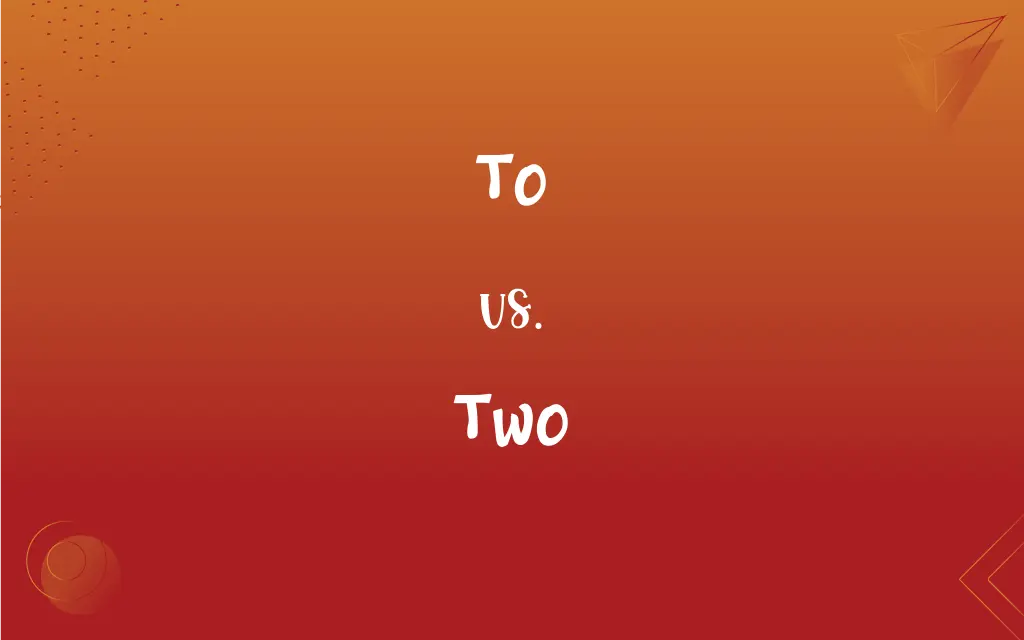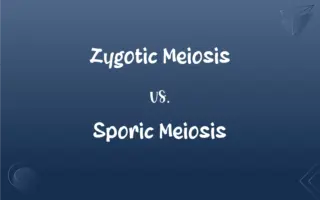To vs. Two: What's the Difference?
Edited by Aimie Carlson || By Harlon Moss || Updated on October 26, 2023
"To" is a preposition or infinitive marker, while "two" is the number 2.

Key Differences
In the English language, the word "to" frequently emerges as a versatile component, primarily serving as a preposition. Its functions are manifold, such as indicating direction or purpose. Contrarily, the term "two" denotes a precise quantity, specifically the number that follows one and precedes three.
When discussing movement or relation between entities, "to" is employed. For instance, one might travel "to" a destination. However, if quantifying objects or subjects, "two" would be the apt choice.
In sentences like "I have two apples", the numerical value is clear. It's essential to discern between "to" and "two" as their implications diverge substantially.
While "to" can help structure the sentence and dictate flow, "two" provides an explicit count of items or entities in context.
Comparison Chart
Part of Speech
Preposition/Infinitive marker
Number
ADVERTISEMENT
Definition
Indicates direction or purpose
Denotes quantity of 2
Use in Sentence
I am going to the park.
I have two dogs.
Numerical Value
None
2
Contextual Meaning
Directional or relational
Quantitative
To and Two Definitions
To
A preposition indicating direction.
She walked to the store.
ADVERTISEMENT
Two
A term indicating a duo or couple.
The two of them danced gracefully.
To
A preposition indicating a relation.
This gift is to you.
Two
An adjective indicating a pair.
She bought two apples.
To
A word signifying a point of contact.
He attached the note to the door.
Two
The number after one and before three.
I have two cats.
To
Used in expressing motion.
They traveled to Paris.
Two
A symbol representing a count of 2.
Two students raised their hands.
To
An infinitive marker used before verbs.
I want to eat.
Two
The cardinal number equivalent to 1 + 1.
Two pencils lay on the desk.
To
In a direction toward so as to reach
Went to the city.
Two
The cardinal number equal to the sum of 1 + 1.
FAQs
Is "two" an adjective?
Yes, "two" can function as an adjective, as in "two cars."
How is "to" used before verbs?
"To" can be used as an infinitive marker, as in "to run" or "to eat."
Can "to" indicate a relationship?
Yes, "to" can indicate a relationship, like in "This belongs to her."
What is the primary difference between "to" and "two"?
"To" is a preposition or infinitive marker, while "two" denotes the number 2.
Can "to" be used to indicate purpose?
Yes, "to" can be used to indicate purpose, like in "I went to buy groceries."
Is "to" used in phrasal verbs?
Yes, "to" is used in phrasal verbs like "to give in" or "to look forward to."
Can "to" be used in expressing ratios?
Yes, "to" can be used in expressing ratios, like "3 to 1."
What does the word "two" represent?
"Two" represents the number 2.
Is "two" ever used metaphorically?
Yes, "two" can be used metaphorically, like in "It takes two to tango."
Can "to" indicate a destination?
Yes, "to" can indicate a destination, as in "I'm going to Paris."
What is the numeral form of "two"?
The numeral form of "two" is "2."
Is "two" ever used in expressions?
Yes, "two" is used in expressions like "in two minds" or "put two and two together."
What comes after the number "two"?
After "two" comes the number three.
Can "two" be spelled differently?
No, "two" representing the number 2 is always spelled as "two."
How do "to" and "too" differ?
"To" is a preposition or infinitive marker, while "too" means "also" or indicates excess.
Is "two" related to "twins"?
Yes, "twins" refers to "two" offspring born at the same time.
Is it common to confuse "to" with "two"?
Yes, due to their similar pronunciation, "to" and "two" are often confused, especially in speech.
What part of speech is "to"?
"To" can be a preposition or an infinitive marker.
How do I use "two" in a sentence?
You can use "two" to denote quantity, like "I have two siblings."
Is "to" always followed by a noun?
No, "to" can be followed by a verb, as in "to go," or by a noun, as in "to the park."
About Author
Written by
Harlon MossHarlon is a seasoned quality moderator and accomplished content writer for Difference Wiki. An alumnus of the prestigious University of California, he earned his degree in Computer Science. Leveraging his academic background, Harlon brings a meticulous and informed perspective to his work, ensuring content accuracy and excellence.
Edited by
Aimie CarlsonAimie Carlson, holding a master's degree in English literature, is a fervent English language enthusiast. She lends her writing talents to Difference Wiki, a prominent website that specializes in comparisons, offering readers insightful analyses that both captivate and inform.































































